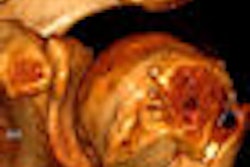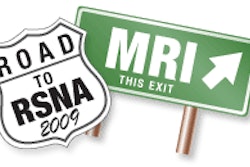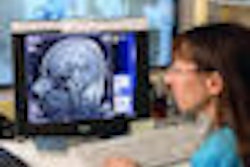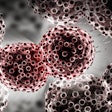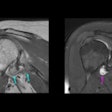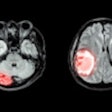The issue of gadolinium-based contrast agents and their possible link to nephrogenic systemic fibrosis (NSF) will be discussed next month by a joint meeting of two U.S. Food and Drug Administration (FDA) advisory committees.
The FDA's Cardiovascular and Renal Drugs Advisory Committee and Drug Safety and Risk Management Advisory Committee will meet on December 8 to review data from gadolinium contrast manufacturers. The ultimate goal is to provide the FDA with recommendations to minimize NSF risk, differentiate the risk of NSF between contrast products, and give guidance on labeling and other risk-reduction methods.
Two years ago, an apparent rise in the number of NSF cases prompted the FDA to request gadolinium contrast manufacturers to include a black box warning on their product labels about the potential for NSF. At that time, the label read: "The extent of risk for NSF following exposure to any specific gadolinium-based contrast agent is unknown and may vary among the agents."
Over the past two years, additional clinical data have been accumulated, and next month, the manufacturers have a maximum of 20 minutes each to present evidence on behalf of their products.
Contrast manufacturers
Bayer HealthCare Pharmaceuticals of Wayne, NJ, will offer efficacy details for Magnevist; Bracco Diagnostics in Princeton, NJ, will have data on its gadobenate dimeglumine product MultiHance; Covidien of Dublin, Ireland, will present evidence on Optimark; GE Healthcare of Chalfont St. Giles, U.K., will speak on behalf of Omniscan; and Lantheus Medical Imaging of North Billerica, MA, will highlight its MR angiography (MRA) contrast agent Ablavar.
The FDA already has received some data from the companies on NSF cases related to their products. According to the FDA briefing document, there have been 1,161 cases of NSF reported globally. GE's Omniscan had the greatest number of reported cases at 611, followed by Bayer's Magnevist with 455 cases and Covidien's Optimark with 70 cases.
The document noted that the reliability of the data may be limited due to the "variable definition of a reported case; lack of consistent criteria until 2009 for the diagnosis of NSF; an undetermined number of duplicate reports; lack of dosing information; and lack of information concerning renal function testing."
In the past few years, the document also noted, warnings on product labels from the manufacturers, increased awareness of NSF, and patient screening for renal impairment have contributed to a decline in NSF cases.
Vendor presentations
Lantheus Medical Imaging plans to present the case for its MR angiography contrast agent Ablavar. In April, Lantheus bought the rights to the agent from Epix Pharmaceuticals of Lexington, MA, when the agent was known as Vasovist. The FDA approved Vasovist for MR angiography in 2008, but the contrast agent has been marketed and used only outside of the U.S. Lantheus hopes to launch Ablavar in the U.S. next month.
At the advisory panel meeting, Lantheus plans to present evidence to support Ablavar's efficacy in MR angiography, according to Dr. Mark Hibberd, Lantheus' senior medical director and head of global medical affairs.
"We will go through the clinical trial safety results and give a brief review of the postmarketing safety data we have, recognizing that data is collected by others around the world and was not part of the U.S. population experience," Hibberd said. "We will note the fact that there was no evidence of NSF seen in any clinical trials or postmarket reports to date."
He added that NSF has "not appeared in the spectrum of adverse effects that Ablavar has had, nor have there been any changes in skin conditions or minor adverse events, which suggested any evidence of NSF."
Providers' caution
Hibberd jointly credited healthcare providers' caution in using gadolinium-based contrast agents and Ablavar's properties for the absence of NSF cases. "[Ablavar] is a blood-pool contrast agent, and rather than leaking out of the bloodstream quickly and limiting the time for imaging, this agent remains in the bloodstream for up to an hour for the purposes of medical imaging and provides an opportunity for radiologists and others to get very high-resolution images," he said.
While he declined to speculate on the outcome of the meeting or a final FDA decision, Hibberd said the company hopes the panel will "think favorably of Ablavar, in the sense that it is the first approved MRA agent and so far has a very good safety profile."
Healthcare technology firm Covidien also will present evidence at the panel meeting. Earlier this month, Covidien voluntarily contraindicated the use of its gadolinium-based contrast agent Optimark in MRI procedures involving patients with severe renal impairment. The company modified its label to reflect a contraindication for this patient population, which, Covidien estimated, constitutes less than 0.5% of the U.S. population.
Susceptible patients
"We have concluded that the Optimark contrast agent should be reserved for the vast majority of patients -- more than 99% -- where the benefits are well established," said Covidien spokesperson Erica Abbett. "For the small percentage of the U.S. population -- less than 0.5% -- with severe renal impairment, we believe it is prudent to act now, rather than wait for a causal link between gadolinium-based contrast agents and nephrogenic system fibrosis to be established."
Although the label already advised caution when using gadolinium-based contrast agents, Covidien made the change "to help ensure this small, at-risk population does not receive administration of a contrast agent that could pose a risk of NSF," Abbett added.
Officials from Bracco Diagnostics declined comment on the advisory panel meeting. Representatives from GE and Bayer HealthCare were unavailable prior to press time.
By Wayne Forrest
AuntMinnie.com staff writer
November 24, 2009
Related Reading
Covidien to modify Optimark labeling, November 9, 2009
MRI contrast media switch eliminates NSF cases, October 15, 2009
Mayo study finds few serious reactions to CT and MRI contrast, September 21, 2009
Gadolinium-based contrast agents alone don't cause NSF, study finds, July 8, 2009
JHU study: Screening patients prior to MRI lowers NSF risk, February 4, 2009
Copyright © 2009 AuntMinnie.com




